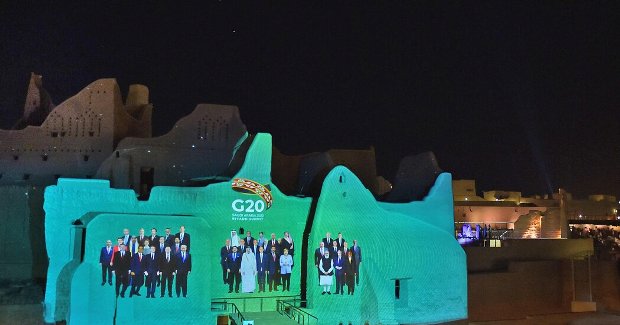Saudi Arabia and human rights activists fight over kingdom’s image at G-20
By Ben Hubbard
BEIRUT — For Saudi Arabia, hosting the Group of 20 summit in Riyadh this year was supposed to cement its global stature. Heads of state from the world’s richest nations were to be wowed by the kingdom’s rugged beauty and changing society — and encouraged to let its war in Yemen and murder of a prominent journalist drift into the past.
For critics of Saudi Arabia’s human rights record, the event looked very different: a golden opportunity to highlight the kingdom’s abuses and press world leaders to embarrass its de facto ruler, Crown Prince Mohammed bin Salman.
The two-day summit, which started Saturday (21), is not expected to live up to either side’s hopes. Instead, the coronavirus has effectively reduced the G-20 summit — like so many other meet-ups this year — to a giant webinar.
That may not be entirely bad news for Crown Prince Mohammed. Despite fierce campaigning by activists, no state chose to boycott the virtual event, marking a significant step in the crown prince’s rehabilitation among world leaders.
“Clearly, it has not gone as planned, but that may have been a blessing” for the Saudis, said Karen Young, a resident scholar at the American Enterprise Institute who studies Middle Eastern economies.
Heads of State and other dignitaries who might have balked at appearing in photos in Riyadh have less to lose at an online event, she said, while the summit still advances the kingdom’s goal of claiming a place among powerful countries it considers peers.
“A virtual conference plays to Saudi Arabia’s strengths and could prevent any embarrassing mishaps,” she said.
The summit, which continues Sunday, is expected to address the battle against the coronavirus, the restart of damaged economies and potential financial aid for poor countries hit hard by the pandemic.
King Salman bin Abdul-Aziz Al Saud Salman of Saudi Arabia opened the summit Saturday with a video address calling on rich countries to ensure that poor nations also receive tools to fight COVID-19.
“We must work to create the conditions for affordable and equitable access to these tools for all peoples,” the 84-year-old monarch said. “At the same time, we must prepare better for any future pandemic.”
Also on the agenda is potential debt relief to help poor countries deal with the economic fallout of the pandemic, and a European Union proposal for an international treaty on pandemics.
President Donald Trump briefly took part in the summit Saturday from the White House Situation Room, but he was not listed as a participant at a sideline event on pandemic preparedness. Instead, he followed his recent weekend routine of tweeting baseless assertions of US election fraud and heading to his Virginia country club for a round of golf.
The G-20 is a forum for the 19 nations with the world’s largest economies and the European Union to discuss global economic affairs. The organization’s presidency rotates among five groups of countries, with one country in each group holding the position at a time. Saudi Arabia, in a group with Canada, Australia and the United States, was named president for the first time last December. It is the first Arab country to host the summit.
The kingdom celebrated the title as a recognition of the importance of the world’s largest oil exporter in the global economy as well as an opportunity to showcase vast social and economic reforms being championed by Crown Prince Mohammed, whose father, King Salman, became the Saudi monarch in 2015.
Since then, Crown Prince Mohammed has lifted some restrictions on women, promoted entertainment and tourism, and advanced plans to diversify the economy away from oil. He has also led the Saudi military into Yemen’s civil war, which has become a grave humanitarian crisis, and locked up clerics, women’s rights activists and even members of the royal family.
In 2018, Saudi agents entrapped, killed and dismembered the dissident Saudi writer Jamal Khashoggi inside the Saudi consulate in Istanbul, damaging Crown Prince Mohammed’s reputation and leading to calls from activists to punish Saudi Arabia for that and other human rights violations.
Those activists seized on the kingdom’s presidency of the G-20 to campaign for their cause, lobbying members of the group to boycott the summit or use it as a platform to call for the release of detainees.
Last month, Nobel Prize-winning economist Joseph Stiglitz used his keynote address at a related event organized by Saudi Arabia to call for a moment of silence for Khashoggi and for women who were detained after opposing and defying the kingdom’s former ban on women driving. The ban was lifted in 2018, but some of the women remain in detention.
“If this meeting does not come to terms with the violations of these human rights and those in other countries around the world, it cannot hope to achieve inclusive societies for which we all strive,” Stiglitz said in a video of the event, called the Think 20 summit, that was captured by activists but not published on the event’s website.
The mayors of Paris, Los Angeles, London and New York declined invitations to join G-20 events, and a number of rights groups organized an alternative virtual summit this weekend to highlight the kingdom’s human rights record.
But the critics appear to have had a limited effect on the headline event, the leaders’ summit.
During a media briefing Saturday, a reporter asked Khalid al-Falih, the Saudi investment minister, if negative headlines had deterred investors from embracing the kingdom.
The moderator tried to dismiss the journalist, but al-Falih answered anyway.
“Investors are not journalists,” he said. “Investors are looking for countries where they can place their trust in an effective government that has proper economic decision-making.”
Diplomats from a number of countries participating in the event said their nations regularly raised concerns about human rights directly with the Saudis but considered the summit too important to miss.
-New York Times


